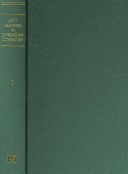Victorian & Edwardian Anti-feminism S.
1 total work
The beginnings of the modern idea of 'feminism' are usually traced to the publication of Mary Wollstonecraft's "Vindication of the Rights of Women" in 1792. Since then, women's emancipation has been a constantly debated and topical subject. This series entitled "Victorian and Edwardian Anti-Feminism" will present the other side of the debate - anti-feminism - more or less obviously through novels and other writings of the nineteenth and early twentieth centuries. "Anti-Feminism in Edwardian Literature" is the second in the three-set series. It consists of six volumes of writings depicting various aspects of the anti-feminist ideology that was still making a strong stand against the increasingly widespread movement towards feminism and suffrage in early twentieth-century Britain. The five works have been chosen to illustrate six concepts in the anti-feminist debate, continuing into the twentieth century. Volume 1 is a work of fiction by Mrs Humphry Ward entitled "Daphne or, Marriage a la Mode". The anti-divorce plot enables Ward to induct feminism as moral and social anarchy, whose most destructive impetus is directed at the family.
Volume 2 consists of three short works illustrating socialist and progressive anti-feminists. Volume 3 is made up of two literary pieces in journals and a book by A.R. Wadia that gives the colonial response to feminism. Volume 4 is a 1913 anti-feminist tract by Ethel Colquoun, "The Vocation of Woman". Volume 5 consists of two works illustrating suffrage and sex extinction by two prominent female writers of the time: Marie Corelli and Arabella Kenealy. Arnold Bennett's "Our Women: Chapters on the Sex-Discord forms", Volume 6. In it he supports the idea of women's economic independence only to reaffirm the centrality of female domesticity.
Volume 2 consists of three short works illustrating socialist and progressive anti-feminists. Volume 3 is made up of two literary pieces in journals and a book by A.R. Wadia that gives the colonial response to feminism. Volume 4 is a 1913 anti-feminist tract by Ethel Colquoun, "The Vocation of Woman". Volume 5 consists of two works illustrating suffrage and sex extinction by two prominent female writers of the time: Marie Corelli and Arabella Kenealy. Arnold Bennett's "Our Women: Chapters on the Sex-Discord forms", Volume 6. In it he supports the idea of women's economic independence only to reaffirm the centrality of female domesticity.
